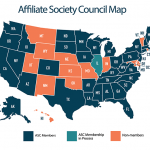More Credibility = More Influence
The ASC also helps lend state rheumatology advocates more credibility, said ASC Chair Christopher Adams, MD, FACP, FACR. He attended the May 16 meeting by phone.
“Based on my experience, [membership in the ASC] helps state societies gain a lot of traction because they can say, ‘Here is our national, expert organization’s policy about this,’” he says. “There’s a credibility that trickles down to the local lawmakers. Our job is to influence policy; our job is not to make policy, but at the same time, if we can help the ones making policy by making their lives a little easier, it’s a win-win situation.”
More Involvement Needed
Manuela Marinescu, MD, a rheumatologist at Rheumatology Associates of Long Island in New York, was forced to participate by phone after her flight was canceled; however, she came away from the meeting with ideas and inspiration, particularly with regard to involving more rheumatologists in advocacy.
“We really need to get more people involved and try to get fellows thinking about it—although they are so busy they don’t have time to learn about all these bills. But in private practice, we are always exposed to this. Even if we don’t want to [get involved], we have to,” Dr. Marinescu says.
She echoed Mr. Cantrell, who said one of the most valuable aspects of the meeting was brainstorming ideas to help inspire more rheumatologists—and in particular recent graduates—to get involved in advocacy work.
“‘Good policy makes good practice’ is one of the things I told the group,” Mr. Cantrell says. “If you don’t have good policy at the state level or the federal level, that can make your practice more difficult, the paperwork can be more of a burden, and often, it makes you less profitable. And with policies like step therapy, it can make your patients suffer more.”
Dr. Marinescu appreciated a suggestion that came out of the ASC meeting to get involved with other specialists in each state, particularly in oncology, gastroenterology, dermatology, “all of whom also use biologics,” she says.
Dr. Wasner applauds the value of cooperative advocacy work, both in his own state, and through the ASC.
“Advocacy is kind of lonely stuff, and people don’t have a lot of time to spend doing it,” says Dr. Wasner. “Having other people to connect to from other states helps multiply the effects that you have, instead of just having your own tiny little perspective. It also gives us some fellowship and motivation.”

